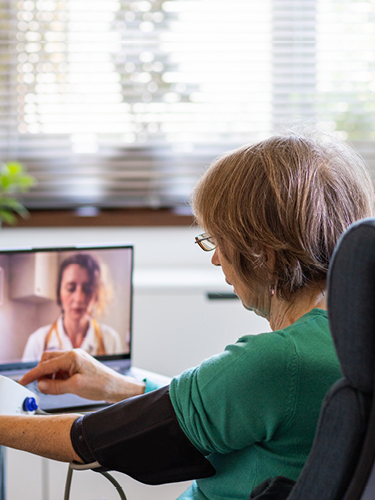Ambulatory Care Practices Adapt to the Pandemic Environment
Submitted By:
Sarah M. Michienzi, PharmD, BCPS, AAHIVP
May 14, 2020
The majority of the ambulatory care clinics at the University of Illinois – Chicago (UIC) UI Health Outpatient Care Center have transitioned from in-person encounters to telemedicine visits for eligible patients. Doing so allows the provision of care without the need for patients to be physically present in the clinic, decreasing the risk of exposure to COVID-19. This is critical for vulnerable patients, such as those with AIDS and other immunocompromised conditions. While some clinics were conducting video telemedicine visits previously, this is a new process for most clinics. Care teams have adapted quickly while also familiarizing patients with this new approach.
ACCP member Sarah M. Michienzi, Pharm.D., BCPS, AAHIVP, Clinical Assistant Professor and HIV/ID Clinical Pharmacist at UIC, reports that the experience has thus far been very positive in the Family Center for Infectious Diseases (FCID) Clinic. “We are only conducting a handful of in-person visits for patients that require physical exams or specimen collection, or those with urgent needs who are unable/unwilling to complete a telemedicine visit,” says Dr. Michienzi. Across all of UIC’s HIV/infectious diseases clinics, clinical pharmacists are evaluating medical records, identifying patients in need of refills (and providing 90-day supplies when possible), determining who can be rescheduled on a future date, and conducting COVID-19 evaluation and education. Most of these interventions were previously telephonic. However, the health system quickly created guidance for telemedicine delivery using WebEx, and clinicians are now beginning to use InTouch. Due to relaxed HIPAA regulations regarding telemedicine during the pandemic, other platforms can also be used.
The clinical pharmacists’ major responsibility within their healthcare teams is ensuring that patients receive safe and effective medication therapy. Often, for our patients living with HIV, this requires helping with medication assistance applications and coordinating medication pick-ups for those unable to receive home deliveries. Dr. Michienzi adds, “We developed innovative ways to complete assistance applications electronically with patients, even for those with limited access to technology. We’ve also delivered medications to patients to help minimize their use of public transportation. While the pandemic has interrupted many aspects of our lives, we cannot allow it to interrupt patients’ access to medications, especially antiretrovirals.”